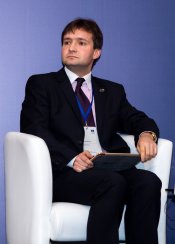Contact center of the Ukrainian Judiciary 044 207-35-46

At the conference “The Role of the Supreme Court in Protecting Human Rights and Fundamental Freedoms” devoted to the first year of the Supreme Court’s functioning, judge of the SC Grand Chamber Dmytro Hudyma presented his speech on the SC Grand Chamber experience in the execution of the ECHR judgments by means of reviewing cases at national level in situations, when Ukraine loses cases in the ECHR.
Dmytro Hudyma reported that during the year, the SC Grand Chamber considered per se 70 applications on reviewing judgments under exceptional circumstances; 9 applications were satisfied completely, 5 applications were satisfied partially, 40 applications were dismissed, proceedings as for 16 applications were closed.
Such correlation has an objective basis: the Law of Ukraine “On the Execution of Judgments and the Application of the Case Law of the European Court of Human Rights” obliges the Government Agent of Ukraine before the European Court of Human Rights to inform all applicants, in whose favor the ECHR judgments were adopted, about the fact that they may initiate reviewing their cases in Ukraine.
The existence of relevant provision in the noted Law often causes groundless applications to the Supreme Court concerning reviewing judgments under exceptional circumstances. Moreover, upon each such application, the Supreme Court is obliged to open proceedings, even if the ECHR judgment cannot be the reason for reviewing judgments adopted at the national level.
The example of the above-described situation was represented by applications received by the SC Grand Chamber on the grounds of the ECHR judgment of 12 October 2017 in the case “Burmych v. Ukraine”, by which 12 148 applications against Ukraine concerning long-term non-fulfillment of current decisions of Ukrainian courts were excluded from the register.
Obviously, the SC Grand Chamber was not able to satisfy such applications, since, firstly, there were no reasons for reviewing judgments adopted by Ukrainian courts in favor of applicants; secondly, the ECHR in its judgment as for the noted case stated that the national government during two years had to take measures of general, but not individual, nature for the execution of current decisions of national courts, Dmytro Hudyma explained.
He remarked that due to legislative shortcomings, the SC Grand Chamber had to, initially, accept for consideration, and then, by means of resolutions, dismiss 25 applications; additionally, 12 proceedings were closed. To guideline law-enforcement practice, the SC Grand Chamber in its resolutions formed an opinion, pursuant to which reviewing judgments under exceptional circumstances according to Item 2 of Part 3 of Article 423 of the Civil Procedure Code of Ukraine shall not be applied as a measure of individual nature to execute the ECHR judgment in those cases, when violation of international commitments by Ukraine, identified by the ECHR:
Besides, Dmytro Hudyma paid attention to cases on ensuring judges’ reinstatement, who, as the ECHR in its decision “Kulykov and Others v. Ukraine” stated, were dismissed from their positions in violation of the Convention for the Protection of Human Rights and Fundamental Freedoms. In the view of the contents of this judgment and requirements of the national legislation, the applicants’ reinstatement did not take place under the results of reviewing judgments. For appropriate execution of the ECHR judgment, the High Council of Justice and, probably, the Parliament shall issue their opinions.
While presenting the speech, the judge of the SC Grand Chamber also put stress on jurisdictional conflicts and, particularly, recollected the ECHR judgment in the case “Shestopalovà v. Ukraine”, where the applicant was deprived from the right to the access to court due to controversial clarifications of judges as for the jurisdiction for the consideration of the case. The SC Grand Chamber formed practice, pursuant to which, if a court, which had to consider a case pursuant to procedural law, had closed the proceedings noting the necessity of its consideration by a court of another jurisdiction, and the last one considered this case per se or also closed proceedings due to the lack of jurisdiction, the SC Grand Chamber shall indicate the jurisdiction, within which relevant cases had to be considered; however, the Grand Chamber shall not admit repeated closing of proceedings for directing the applicant to a court, the access to which has been closed previously.